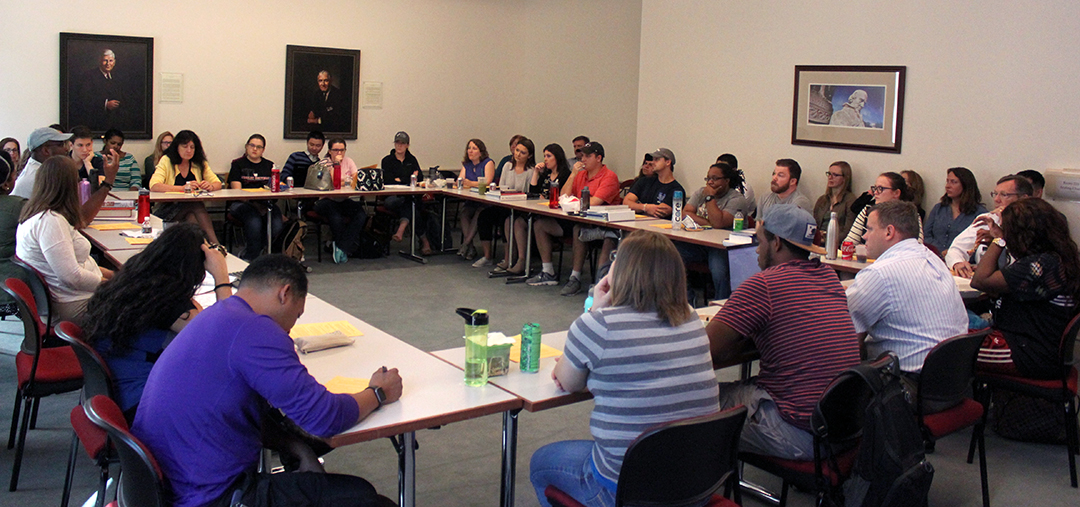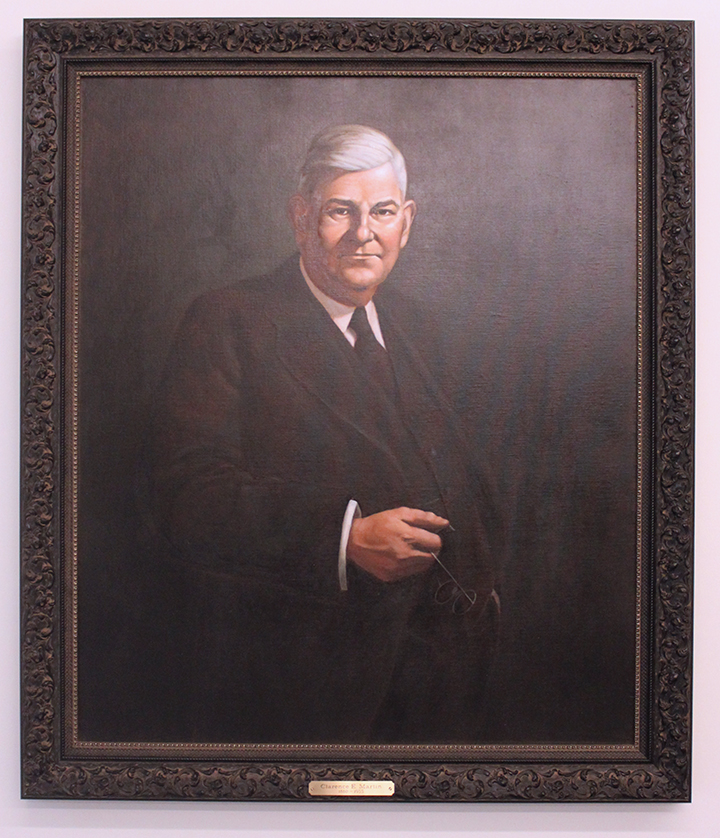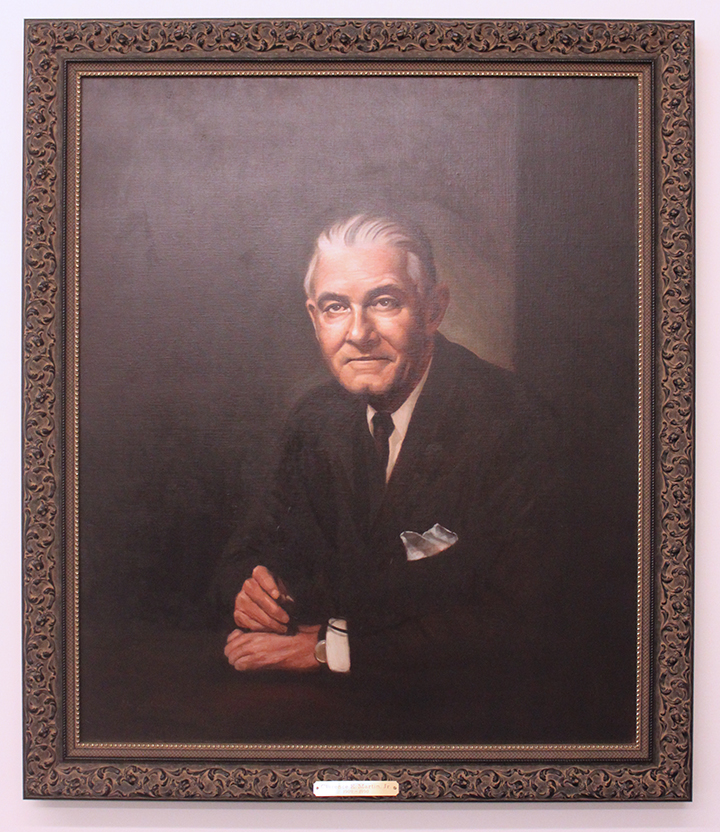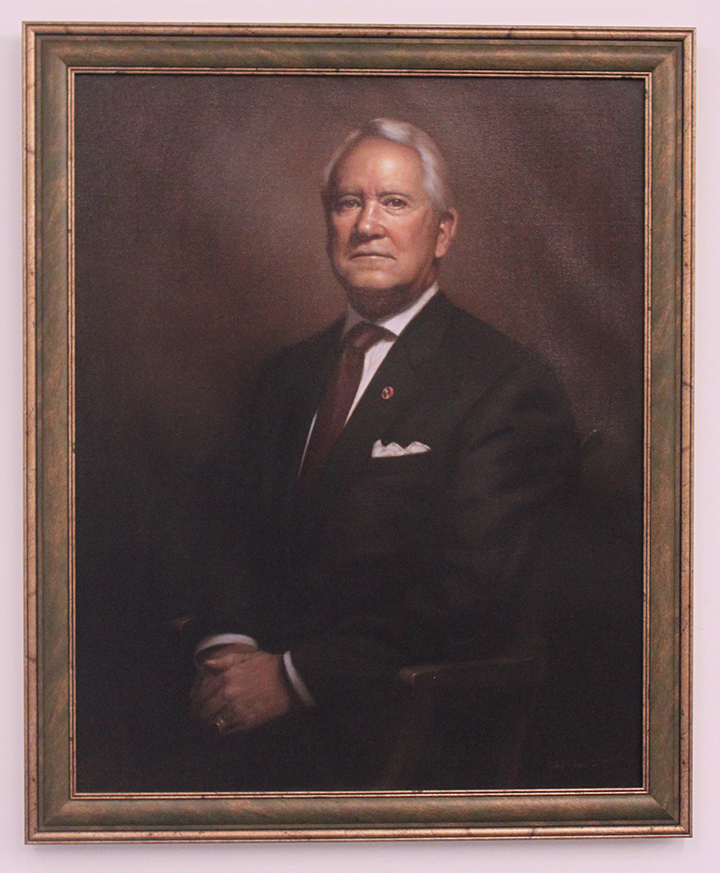
Three generations of Martin family graduates have supported the Columbus School of Law throughout the years. The Martin Family Seminar Room recognizes Clarence E. Martin, who graduated in 1901, his son, Clarence E. Martin Jr. '34, and Clarence E. Martin III '74 ( the grandson of Martin and the son of Martin, Jr.). This past summer Clarence Martin III had his portrait added to the room.
All three of the Martins have been extremely involved in public service and this was reinforced by their experiences and training they received while at CUA Law.
Clarence E. Martin (Class of 1901) was a lifelong attorney in Martinsburg, West Virginia. Martin's achievements were many and varied:
 • He was one of only two West Virginians to ever serve as president of the American Bar Association
• He was one of only two West Virginians to ever serve as president of the American Bar Association
• Martin took part in hearings before the Senate's Committee on Foreign Relations in 1934, when the United States was considering its participation in the World Court. He represented supporters of the treaty to join the court, and in the end America did.
• Martin was appointed to fill a vacant United States Senate seat from West Virginia, but due to an unusual and complicated political/legal scenario, did not wind up actually serving.
• Martin was one of the two or three people most responsible for the merger of the Catholic University Law School with the Knights of Columbus School of Law in the 1950's, producing today's Columbus School of Law.
• Martin was anointed a Knight Commander of Saint Gregory by Pope Pius the XI and later awarded the star (an elevation in rank) by Pope Pius the XII.
Clarence E. Martin Jr. (Class of 1934)
 • Martin graduated second in his class at the Columbus School of Law and returned to Martinsburg to practice law with his father and brother, Morgan.
• Martin graduated second in his class at the Columbus School of Law and returned to Martinsburg to practice law with his father and brother, Morgan.
• In 1941, he began a lifelong career in public service when he was elected Prosecuting Attorney for Berkeley, County, W.V. In 1942, he enlisted in the U.S. Navy during World War II where he served in the Intelligence Service and was one of the invasion planners in the Pacific Theater.
• In 1950, Martin was elected to the West Virginia Senate and served for 20 years. He served a number of terms as Majority Leader.
• He served as President of the West Virginia Bar Association, and was a founder and President of the West Virginia State Bar.
• The Columbus School of Law honored Martin with the Alumni Achievement Award in 1984.
Clarence E. Martin III (known as CEM) (Class of 1974)
 • CEM worked as an Assistant Counsel for the Interstate and Foreign Commerce Committee (now known as the House Committee on Energy and Commerce) in the U.S. House of Representatives and, later, as a Trial Attorney for the U.S. Department of Justice before returning to Martinsburg to join his father in the law firm founded by his grandfather, Clarence E. Martin.
• CEM worked as an Assistant Counsel for the Interstate and Foreign Commerce Committee (now known as the House Committee on Energy and Commerce) in the U.S. House of Representatives and, later, as a Trial Attorney for the U.S. Department of Justice before returning to Martinsburg to join his father in the law firm founded by his grandfather, Clarence E. Martin.
• CEM embarked on what has become a life of public service when he was elected to the West Virginia House of Delegates. In doing so, he followed a family tradition, being the fifth generation on both his father's and mother's side to serve in the Virginia or West Virginia Legislatures.
• CEM served on the US Commission of Agricultural Workers which investigated the living conditions and wages of agricultural workers. He also served on the West Virginia Council on Community and Economic Development as a founding member. The Council directs the state's economic development efforts.
• CEM followed in the footsteps of both his father and grandfather as President of the West Virginia Bar Association.
• In 1980, CEM was designated one of the top 50 legislators for his work on raising the salary and benefits of WV's public employees.
• CEM was asked by U.S. Senator John D. Rockefeller, IV to form the Discover the REAL West Virginia Foundation. He served as the foundation's Chair for 11 years.
• Committed to preserving history, in 1998, CEM was tasked by the County Commission of Berkeley County, West Virginia to lead the restoration and preservation of the historic B&O Railroad roundhouse complex in Martinsburg, raising over eight million dollars for the project.
"We have benefited from not only the excellent legal education but the teachings of Catholic social responsibility and the special ethical responsibility that is taught to its students that the law school provides," says CEM '74, told the law school in 2011.
